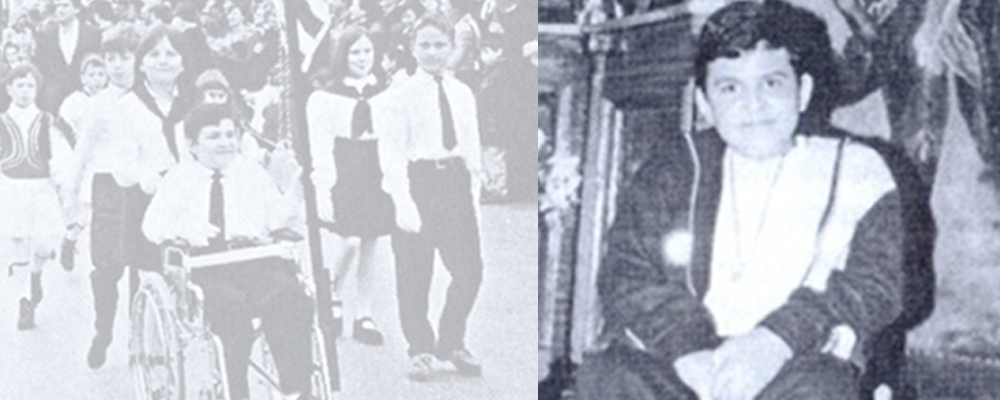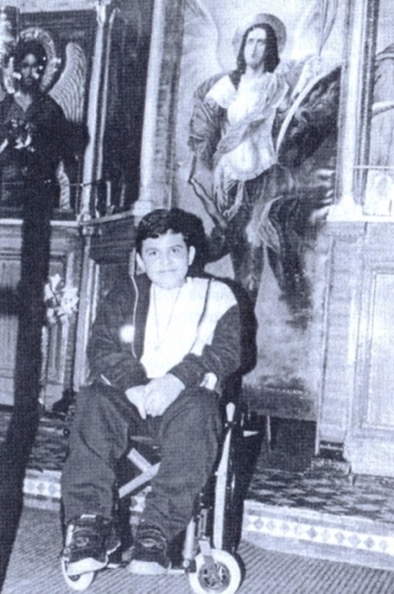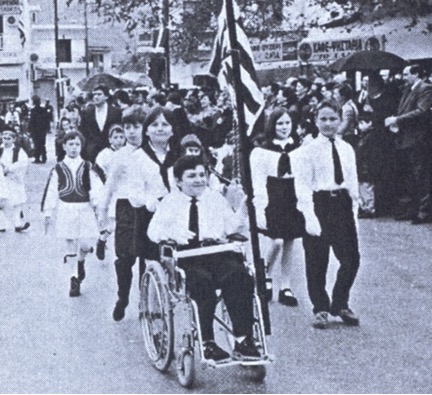
Marios Nasios: The wounded eagle
Marios Nasios was born on the feast day of Ypapanti (Presentation of the Lord in the Temple), on Sunday, February 2, 1987. At the age of 5 he began to experience difficulty walking, instability, fatigue, and difficulty climbing stairs or getting up. At the age of 7, he was diagnosed with Duchenne muscular dystrophy, a rare genetic disorder that occurs primarily in boys. The illness is characterized by progressive muscle degeneration and weakness, until the patients are finally immobilized. Due to weakness of the breathing muscles, they suffer respiratory problems.
Marios went through these stages. From the age of 8 he was in a wheelchair. He was however a charismatic child. He was an excellent student up to the third grade of high school (he died when he was 17 years old). He was the flag-bearer in parades, holding the flag with pride. He had a natural smile, godly wisdom, and a sense of gratitude, while a “Thank you” was always on his lips towards everyone: his mother who was taking care of him, his classmates, the teachers, and his spiritual father, Father Gervasios.
He said: “I am very well. I have no need of anything. I feel fulfilled. I am happy the way I am. I feel that I love the whole world. God must know something to let me be this way; perhaps it is better this way. I thank God, who gave me a mind and I can communicate with people, that I can I read, and that I can figure out everything. If I didn’t have my mind, why would I need hands? A paralytic, who has his mind and is patient, is the smartest person in the world. Mom, God loves us. It is for the sake of our souls if He doesn’t give us our health, but He solves other problems.”
Because of the attack to the heart muscle, he began to experience a fast heart rate. On every day of the week he started school with a pulse rate of 128. Among the difficulties he said: “Other children, who are as ill as I am, are forced to stop going to school because they have no access to school. How many blessings I have!”
His classmates and teachers, always remember his face, shining with joy. He helped many of his friends with his advice and encouraging words, giving lessons of dignity and kindness. He had tenacity, courage and strength. He did not seem to be disturbed on account of his disability. He had spontaneity, with natural humor, and made others laugh and be happy. He was considerate and loving. He said to his mother: “I’m sorry, mom, I’m tiring you out. Sorry, mom, for troubling you. Your feet are my feet too. We are two people and have together two legs. You had an operation on both your legs. So in the afternoon I will read my lessons, while you will go to lay down and rest. And as you look after me in the evening, so I will look after you in the morning!”
Every Sunday he was receiving holy Communion, with excitement and craving. He had a quick mind. Once they asked him, “Which soccer team do you belong to?” “Of Paradise,” he said, and added, “What team can be compared to the Paradise team?”
Pain refines man
In 1995 Marios went through a Medical Committee. However, at that time, his insurance did not provide any benefits for those suffering from muscle degeneration. His mother was saddened, but young Marios said to her: “Mom, it’s not worth worrying about this life. We need to be concerned about the other life. I don’t want you to be sad and cry. As the good Lord provides for the birds, so He will take care of us too. He will provide for us too. Yes, really, He will!”
One time his mother Maria asked him if he wanted to call a group of educated people who took care of children like him, so he would cheer up these children. He said, “No, Mom. I don’t need such company. I have you. I have my books. You take me out and I see the fields, the Church of Transfiguration, and the flowers you planted in our yard. I see my classmates going to their tutorial lessons. I see them outside playing. What else can I want? I do not need any company. I'm very well, truly very well the way I am. I want you to understand this. I’m very well. I miss nothing.”
One day, a social worker, appreciating Marios’ spiritual strength, suggested organizing a meeting with children who were experiencing similar problems, so that he could explain to them how he managed to overcome his own problems and remain always happy. “No,” Marios replied. “If they don’t believe in God, no matter how many hours I talk to them, they won’t be able to overcome with arguments their illness and their other problems.”
Taught by God
Here are a few of his sayings:
- “I am nothing. In any case, people should not be so happy, nor be too sad. We should be modest.”
- “Shall we argue with God? If God wants it to rain, let it rain. Are we made out of sugar?”
- “Mom, God loves us. He cares about us. Surely He gives us difficulties, but He also helps us, and gives us the strength to overcome them. Don’t you see how He’s interested in us? He cares about the birds and He won’t care about us? Look! So many people, who were unknown to us, now surround us with love.”
- “If the sun of love enlightened the world, it would be very beautiful and better. Because the sun of love is Christ Himself.” (This sentence was written in Marios’ report card when he was in 4th grade).
- “What a pity. Relatives should not seek revenge. Instead, they should pray for the repose of the soul of their own relative, but also for the soul of the murderer. God is the only Judge.”
- “I cannot understand why people don’t go to Church.”
His last days
On August 5, 2003, Marios had a pulmonary edema. He was hospitalized in the hospital’s intensive care unit where his conduct, despite a high heart rate of 145, made a special impression to the medical and nursing staff. He constantly thanked everyone, without complaining about anything. Indeed, he considered this serious episode of his health an opportunity to meet other people.
Three months later, he had the first episode of cardiac arrest. On November 25, 2003 he fell asleep in the Lord.
On the day of his funeral, the plan was to place him on a hearse. But it wouldn't start, even though no problem was detected. It was unexplainable! His classmates wanted to carry Marios on their own shoulders, and eventually it was done as they wished. The incident was considered to be a “sign.” Thus in the moving funeral procession Marios was carried on the shoulders of his classmates.
At the cemetery, during the memorial service, they all chanted the hymn, Christ is Risen!
On that year's album, the High School graduates placed his name at the top, all by itself, with big letters: MARIOS! And underneath they wrote:
“It was a great honor and joy to have met you here on this earth, Marios. It would be a greater honor and happiness to meet again in the other life, which is eternal.”
Translation by Fr. E.H.
Greek original: http://www.diakonima.gr/2020/02/02/marios_nasios/


Thauma. Moving and inspiring story.
Ioannis karl
What a positive outlook he had…I can see why you call him the wounded eagle..